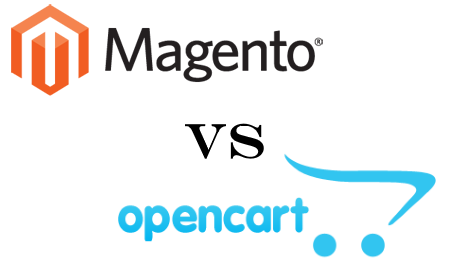Magento Vs OpenCart - Which Ecommerce System Is Better?

It is essential for any ecommerce business to provide an easy and intuitive shopping experience for their customers. This is especially so for small businesses, who have to compete with the bespoke shopping carts of giants like Amazon and eBay. At the same time, a small business ecommerce system has to be secure, easy to install and have a range of inventory control, payment and accounting options. All this has to happen without breaking the budget, which can make it a challenge for small online stores to pick the right system.
The choice for small businesses frequently comes down to Magento or OpenCart. In this article we explore the relative benefits of both systems. They are both good platforms, so let’s see which one resonates most closely with the goals and requirements of your business.
Common Features of Magento & OpenCart
There are a bewildering number of ecommerce CMS systems available, including ZenCart, Woo Commerce and Big Commerce. For comparison, we have narrowed it down to Magento and OpenCart because these systems both have a suite of handy features that make them suitable for small businesses. Here are some of the strengths that both systems have:
- Both integrate well with WordPress blogs and other PHP powered CMS systems.
- Both can be easily modified with a range of extensions and plug-ins.
- Both are designed to be used by non-programmers, so you won’t need to be a coding genius to use Magento or OpenCart.
- Both can be implemented reasonably quickly with minimal investment.
- Both are versatile and robust systems that can handle a large number of transactions.
- Both are open source applications, meaning you don’t have to pay an annual licence fee or setup charge.
Magento: The Pros & Cons
Individually, Magento and OpenCart both have key strengths, as well as areas in which they don’t perform as well.
Advantages: Magento is a popular choice for ecommerce businesses that already use WordPress for their blog or website. The two apps integrate seamlessly and are a happy marriage, so if you are engaged with content marketing and want a platform that lets you create a bespoke strategy for ecommerce, then take a look at Magento first.
Magento is also extraordinarily flexible. It can be tweaked, twisted and amended to suit almost any design concept, so there is none of the ‘out-of-the-box’ feel that some open source platforms have. As well as looking good, Magento is also feature-rich. You can access advanced features such as product searches, stock reports and inventory audits from an intuitive control panel. And if you need additional features, there are tens of thousands of plug-ins available, developed by an enthusiastic community of developers. Furthermore, custom plug-ins can quickly be designed with the assistance of a web developer.
Magento is also a powerful platform for businesses keen to boost the search engine profile of their store. When you implement Magento, you can access a range of powerful SEO features, such as image tagging and individual product URLs. Whether you operate a single website or many online stores, you can manage them all easily from one convenient admin back office.
Disadvantages: We had to wrack our brains to think of any significant disadvantages of Magento. Some users report that it is relatively slow compared with other platforms. It is also highly complex, which is the downside of the wealth of development options offered by the platform. Unless you have significant programming experience, we don’t recommend you go it alone with Magento. However, this is not a problem when you have a creative development team on your side to set up the system according to your requirements. You can chat with one of our team to find out more about this.
Learn more information on Magento with this great article - JDR: A Magento E-commerce Website Design & Development Company.
OpenCart: The Pros & Cons
OpenCart is a well-respected and versatile ecommerce CMS that powers many successful online shops worldwide. Like Magento, it has some unique features that may appeal to small businesses. There are also some definite disadvantages, which, in our opinion, potential users need to be aware of.
Advantages: OpenCart is the easiest CMS – in terms of both set up and user experience – that we have come across. Non-programmers can set up a basic store within a matter of hours and be trading on the same day – it is that easy. The platform is compact and lightweight, meaning it won’t take up too much server space or slow your website down. You will find plenty of tutorials and instruction videos online to help you make basic customisations to your system, and there is an active community of developers out there to offer support.
When accepting payments, OpenCart is supportive of all the major payment gateways, including PayPal, Sage Pay and World Pay.
Disadvantages: Simplicity comes with its drawbacks, and in the case of OpenCart, this can be a frustrating lack of native features. For instance, OpenCart isn’t the best CMS if you are engaged in active marketing. It isn’t as easy to integrate OpenCart with WordPress, nor does the platform have as many SEO features as its competitor. There are also less customisation options. Although updates to the system are regular and free to download, you will have to recruit the help of a specialist developer if you want to expand beyond the basic features.
Making an Informed Decision
OpenCart is very popular with micro-businesses, community organisations and craftspeople. If this is you, then you should give OpenCart some serious consideration. It is a great alternative to relying on marketplace sites like Etsy, eBay and Amazon if you’re just starting out with your own ecommerce website. However, for professional ecommerce businesses with an eye on marketing potential and expansion, Magento is, for us, the clear choice. As an open source platform, Magento really hits above its weight, opening the door for you to compete with much larger ecommerce businesses.
Of course, the most important part of the decision is to find a CMS that matches your growth strategy. This is where we can help; by assisting you to navigate through your options and implement the ecommerce CMS with the right blend of features and options to suit your requirements. To find out more, please give us a call to speak with one of our marketing specialists.



